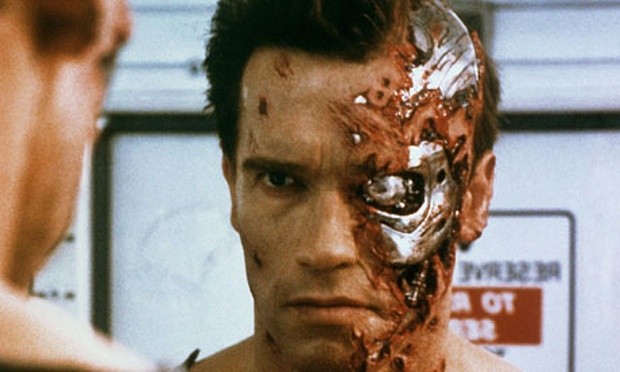This past week, one of Arnold Schwarzenegger’s 3.38 million Twitter followers angrily threatened to unlike the former California governor’s Facebook page. The reason? Schwarzenegger, in celebration of the Supreme Court’s landmark marriage-equality ruling, had added a rainbow filter to his profile picture—an image that depicts him in his iconic role as T-800, the mechanized killing machine of Terminator fame. In his laconic response, the man whose name has become as synonymous with big-budget action movies as it has with celebrity-infused politics dredged up one of his classic zingers:
“Hasta la vista.”
The incident says much about the current state of Schwarzenegger’s public persona. Unlike that of Ronald Reagan, a fellow Californian whose political career far outshone his acting one, the Schwarzenegger brand remains imbued with Hollywood glitz. On Wednesday, July 1, “Ahnold” returned to the big screen in Terminator: Genisys, the latest in a string of shoot-‘em-ups he has starred in since leaving office in 2011. His 2012 memoir is called Total Recall, a nod to his role in the 1990 sci-fi action flick of the same name. He seems tepid about getting back into the political sphere. Although he does run a public policy institute out of USC, he ruled out the possibilities of either a Senate run or White House post in a 2009 interview with the New York Times’ John Harwood, and to date the California governorship is the only elected office he has ever held.
To be sure, Schwarzenegger has also had his share of difficulties and missteps: allegations of sexual harassment; unsuccessful battles with state unions; and a massive sex scandal that ended his marriage to Maria Shriver (a Kennedy) in 2011. The mark that this last failure has left on his legacy, and the hurdle it poses for any political ambitions he might have, are undeniable. It tarnished his image, left him with an illegitimate child, and cut him off from one of the country’s most powerful families. Despite an exhaustive string of apologies, a Senate seat—or really any position that requires a high degree of voter confidence—may no longer be in the cards.
This doesn’t mean, however, that Schwarzenegger has nothing to contribute. He made some significant gains as governor, including a first-in-the-nation cap on greenhouse gas emissions and the appropriation of $3 billion for stem cell research. He was and continues to be a rare phenomenon among prominent Republicans: a moderate adept at effecting bipartisan cooperation. Speaking at a 2007 conference, Schwarzenegger warned his audience that “[the Republican] party has lost the middle, and we will not regain true political power in California until we get it back.”
In other words, the “Governator” (as he has come to be known) has the potential to be a voice for reform in a party skewed far to the right. In an advisory capacity, for example, he could make inroads. With star power that arguably compensates for his narrow breadth of political experience, and a marketable list of policy accomplishments, Schwarzenegger has both credibility and the pulpit he needs to sell donors and candidates on a more centrist philosophy of governance. Does the prospect seem distant? Maybe. But Schwarzenegger has ideas that merit consideration. He may not be indestructible, but this Terminator’s political career is far from shot.

